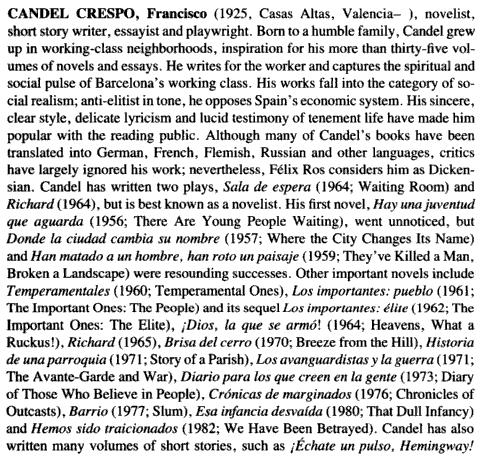
 Candel in English
Candel in English
Francisco Candel (1925-2007) is a Catalan writer who used to have personal diaries which gave substance to many of his more than fifty books. His ephemeral political experience, as senator and town councillor, during the Democratic Transition consolidated the image of a singular and unsettling writer. Through the works Francisco Candel published during the Democratic Transition, he showed his vision of the events of this period in which social, cultural and political expectations were partly frustrated. The sour and ironic caricature he proposed did not meet any success and paradoxically, although he was more exposed in the Catalan public media, his books were at the same time getting forgotten.
![]()
Biography
Dictionary of the Literature of the Iberian Peninsula, p. 290:

Dictionary of the Literature of the Iberian Peninsula, Greenwood Press, Westport, Connecticut, 1993, 1806 pages. Authors: Germán Bleiberg, Maureen Ihrie, Janet Pérez.
In this dictionary, two pages (p. 290-291) are dedictated to Francisco Candel Crespo... [sic]. A confusion with another Francisco Candel, but not the writer called Francisco Candel Tortajada.
In this notice, there are also more mistakes:
1) “Although many of Candel's book have been translated into German, French, Flemish, Russian and other languages, critics have largely ignored his work; nevertheless, Félix Ros considers him as Dickensian”. Actually, one novel was translated into German, two into Flemish, and one into French. The reference to Félix Ros may suggest that the list of languages could come from the prologue writen by him in Obras selectas (1974): « éstos y otros títulos se tradujeron subsiguientemente al alemán, al francés, al flamenco, al ruso y a otros idiomas. » (p. 16). Francisco Candel himself wrote an autobiographical note in Fernando Alvarez Palacios's book, Novela y cultura española de postguerra (1975): « He sido traducido al alemán, francés, flamenco, ruso, catalán, gallego y vasco, y ahora creo que al italiano. » Nevertheless, in A cuestas sobre mis personajes, there is no mention of translation into Russian or Italian, but it is true that some short stories were also published in Russian.
2) “His “obra maestra” is Els altres catalans (1964: the Other Catalonians) which has been translated into Spanish and many other languages”. It is just the opposite. This book was obviously written in Spanish and then translated into Catalan by one of the greatest translators to Catalan of that time, Ramón Folch i Camarasa. And it is not true that it was translated into other languages.
![]()